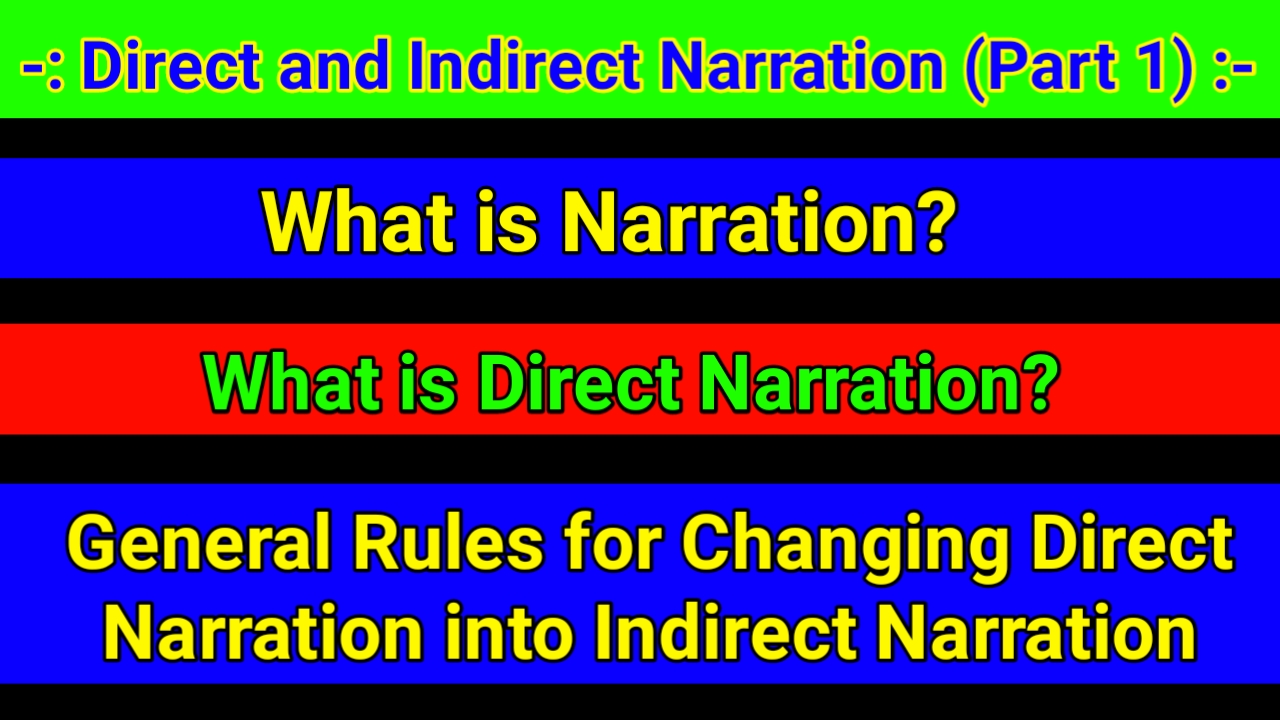Direct and Indirect Narration

-: Direct and Indirect Speech :-
Narration :- “Any thing that is spoken by speaker is called Narration or Speech.”
(वक्ता के द्वारा जो कुछ भी कहा या बोला जाता है उसे हम Narration या Speech कहते हैं।)
Narration दो प्रकार का होता है –
1. Direct Narration (प्रत्यक्ष कथन) 2. Indirect Narration (अप्रत्यक्ष कथन)
Direct Narration :- If we say the actual words of the speaker, it is called Direct Narration.
(“वक्ता के कहे हुए बातों को ज्यों का त्यों उसके शब्दों में प्रकट कर देना ही Direct Narration कहलाता है।”)
Example : Direct – He said to me, “I am a student.”
Direct Narration के दो भाग होते हैं – (i) Reporting Verb (ii) Reported Speech
Reporting Verb :- The verb which introduces the Reported Speech is called the Reporting Verb.
(ऐसा verb जो Reported Speech के बारे में बताता है Reporting Verb कहलाता है।) यह inverted commas से बाहर होता है।
Reported Speech :- The exact words of the speaker which are put within Inverted Commas are called the Reported Speech.
(वक्ता के वे वास्तविक शब्द जो Inverted Commas के अंदर लिखे जाते हैं, Reported Speech कहलाते हैं।)
Reporting Verb Reported Speech
He said to me, “I am a student.”
Note – इस वाक्य में मुख्य रूप से said to ही Reporting Verb है।
Indirect Narration :- If we say the of the words of the speaker in our own words, it will be called Indirect Narration.
(यदि हम वक्ता के कहे हुए शब्द को ज्यों का त्यों न कह कर अपने शब्दों में प्रकट करें तो यह Indirect Narration कहलाएगा।)
Example : Indirect – He told me that he was a student.
Direct से Indirect Narration में बदलने के सामान्य नियम :-
1. Indirect Narration बनाते समय Comma (,) तथा Inverted Commas (“…….”) दोनों को हटा देते है।
2. Indirect Narration बनाते समय Reporting Verb का Tense कभी नहीं बदलते है।
3. Indirect Narration बनाते समय Reporting Verb – said या said to को Reported Speech के भाव के अनुसार told, asked, requested, advised, ordered etc. में बदल देते हैं।
4. Indirect Narration बनाते समय Reporting Verb के पश्चात प्रायः एक उचित conjunction जैसेे – that, if या whether, to का प्रयोग करते हैं।
5. Indirect Narration बनाते समय Reported Speech में आए हुए Personal Pronouns, Tense तथा समय अथवा स्थिति की निकटता सूचक शब्दों में परिवर्तन करते हैं।
6. यदि Direct Narration का Reporting Verb – Present Tense या Future Tense में हो तो Indirect Narration बनाते समय Reported Speech में आए हुए – समय या स्थिति की निकटता सूचक शब्दों या Tense में किसी प्रकार का कोई परिवर्तन नहीं करते है।
Indirect Narration बनाते समय Direct Narration के Reported Speech में आये हुए Personal Pronouns को change करने के सामान्य नियम :-
Rule – 1 यदि Reported Speech में first person का pronoun आये तो इसे Reporting Verb के Subject के अनुसाार change करते हैै।
Rule – 2 यदि Reported Speech में second person का pronoun आये तो इसे Reporting Verb के object के अनुसार change करते हैै।
Note – यदि Reported Speech में second person का pronoun आया हो लेेेेकिन Reporting Verb में object न हो तो first person या third person के pronoun को object मानकर उसी के अनुसाार change करते हैै। परन्तु Reporting Verb का subject- first person का हो तो first person का object नही मानतेे है।
Rule – 3 यदि Reported Speech में third person का pronoun आये तो इसमेें किसी प्रकार का कोई परिवर्तन नहीं करते हैं।
| Person | Subjective form | Objective form | Possessive form |
| First |
I We |
me us |
my our |
| Second | You | you | your |
| Third |
He She They It |
him her them it |
his her their its |
Indirect Narration बनाते समय Direct Narration के Reported Speech में आये हुए Tense को change करने के सामान्य नियम :-
यदि Direct Narration का Reporting Verb – Past Tense में हो तो Reported Speech में प्रयोग हुए Tense को हम निम्न प्रकार से change करते हैं –
- Present Indefinite Tense को Past Indefinite Tense में change करते हैं।
- Present Continuous Tense को Past Continuous Tense में change करते हैं।
- Present perfect Tense को Past Perfect Tense में change करते हैं।
- Present Perfect Continuous Tense को Past Perfect Continuous Tense में change करते हैं।
- Past Indefinite Tense को Past Perfect Tense में change करते हैं।
- Past Continuous Tense को Past Perfect Continuous Tense में change करते हैं।
- Past Perfect Tense को change नही करते हैं।
- Past Perfect Continuous Tense को change नही करते हैं।
Indirect Narration बनाते समय Direct Narration के Reported Speech में आये हुए Modal Verbs या Uses को change करने के सामान्य नियम :-
यदि Direct Narration का Reporting Verb – Past Tense में हो तो Reported Speech में प्रयोग हुए Modal Verbs या Uses को हम निम्न प्रकार से change करते हैं –
- Can को could में change करते हैं।
- May को might में change करते हैं।
- Shall को should या would में वाक्य के subject के अनुसार change करते हैं।
- Will को would या should में वाक्य के subject के अनुसार change करते हैं।
- Should/might/must/ought to/had better/could/would में किसी प्रकार का change नहीं करते हैं।
- Is/am/are को वाक्य के Subject के अनुसार was या were में change करते है।
- Has/have को had में change करते हैं।
Indirect Narration बनाते समय Direct Narration के Reported Speech में आये हुए Time (समय) या Position (स्थिति) की निकटता सूचक शब्दों को change करने के सामान्य नियम :-
यदि Direct Narration का Reporting Verb – Past Tense में हो तो Reported Speech में आये हुए Time (समय) या Position (स्थिति) की निकटता सूचक शब्दों को हम निम्न प्रकार से change करते हैं –
- This को that में change करते हैं।
- Here को there में change करते हैं।
- These को those में change करते हैं।
- Come को go (कभी-कभी) में change करते हैं।
- Today को That day में change करते हैं।
- Yesterday को the previous day या the last day में change करते हैं।
- Tomorrow को the following day या the next day में change करते हैं।
- Ago को before में change करते हैं।
- Hence को thence में change करते हैं।
- Thus को so में change करते हैं।
- Hither को thither में change करते हैं।
- To night को that night में change करते हैं।
Tense संबंधी नियम के अपवाद :-
निम्नलिखित परिस्थितियों में Indirect बनाते समय Reporting Verb के Past Tense में होने पर भी Reported Speech का Tense नहीं बदलता है –
(i) जब Reported Speech का वाक्य कोई Universal Truth हो अर्थात् सदा सत्य रहने वाली बात हो।
Example –
Direct – The teacher said, “The earth moves round the sun.”
Indirect – The teacher said that the earth moves round the sun.
Direct – My mother said, “The sun is hot.”
Indirect – Mother said that the sun is hot.
(ii) जब Reported Speech का वाक्य कोई Habitual Action हो अर्थात् आदत संबंधित कार्य।
Example –
Direct – The teacher said, ” The dogs bark at the strangers.”
Indirect – The teacher said that the dogs bark at the strangers.
(iii) जब Reported Speech का वाक्य कोई Proverb हो अर्थात कहावत हो।
Example –
Direct – My teacher said, ” Honesty is the best policy.”
Indirect – My teacher said that honesty is the best policy.
Direct – My mother said, “Might is right.”
Indirect – My mother said that might is right.
(iv) जब Reported Speech का वाक्य कोई Historical fact हो अर्थात् ऐतिहासिक तथ्य।
Example –
Direct -My history teacher said, ” India got freedom in 1947.”
Indirect – My history teacher said that India got freedom in 1947.
अर्थ की दृष्टि से वाक्य निम्नलिखित पांच प्रकार की होते हैं –
1. Assertive Sentence (साधारण वाक्य)
2. Interrogative Sentence (प्रश्नवाचक वाक्य)
3. Imperative Sentence (आज्ञासूचक वाक्य)
4. Optative Sentence (इच्छासूचक वाक्य)
5. Exclamatory Sentence (आश्चर्यसूचक वाक्य)
Our YouTube channel – https://www.youtube.com/c/Knowledgebeem
Our second YouTube channel – https://www.youtube.com/c/Knowledgebeemplus
Our website – https://www.knowledgebeem.com
Our second website – https://knowledgebeemplus.com
Our Mobile App for class 9 to 12 – https://play.google.com/store/apps/details?id=com.knowledgebeem.online
Join our telegram channel – https://t.me/Knowledgebeem















